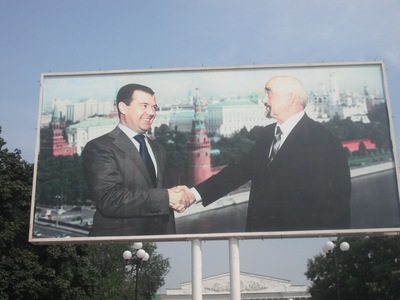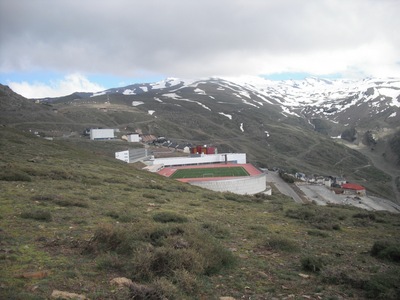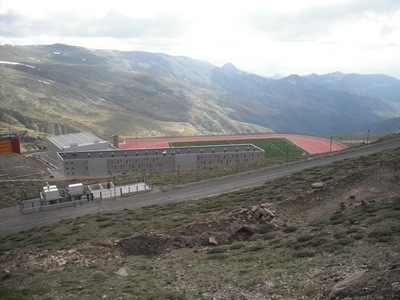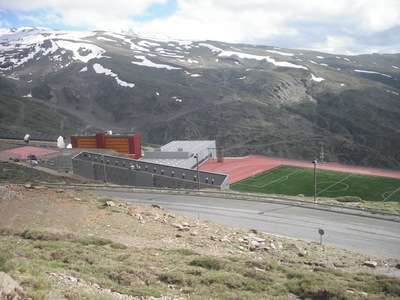We are developing the social individualist meta-context for the future. From the very serious to the extremely frivolous... lets see what is on the mind of the Samizdata people.
Samizdata, derived from Samizdat /n. - a system of clandestine publication of banned literature in the USSR [Russ.,= self-publishing house]
|
Over at Instapundit (and at various other places), Glenn Reynolds has recently spent a lot of time discussing the question of whether Higher Education (and particularly Higher Education in the US) is essentially yet another debt fueled bubble in the process of popping. His reader Peter Galamga recently said the following, implicitely condemning quite a few fields of study and the academic departments associated with them
I think the days of spending the equivalent of a mortgage on one of the many two-word degrees (the second word is usually “Studies”) are coming to a close.
Although the second word might often be “Studies”, I think “usually” is too strong. In particular, one should also be extremely suspicious of courses and fields where the second word is “Science”. These are very seldom worthwhile, and are even less often actually science. “Biology” is good. “Plant Science” is bad. “Statistics” is good. “Political Science”, less so. “Meteorology” and possibly even “Climatology” is likely good. “Climate Science”, I will leave to you.
That said, I think things are much more likely to be okay of the second word is “sciences”. In particular, I can think of one or two truly formidable “Natural Sciences” programs. Does anyone else have any thoughts on this?
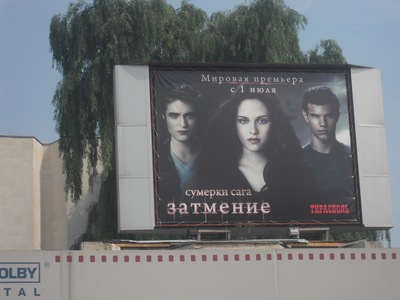 Tiraspol, Transnistria. August 2010.
Amusingly, these two billboards are in front of adjacent buildings. Both, alas, are some distance from the brandy distillery that appears on the Transnistrian five rouble banknote.
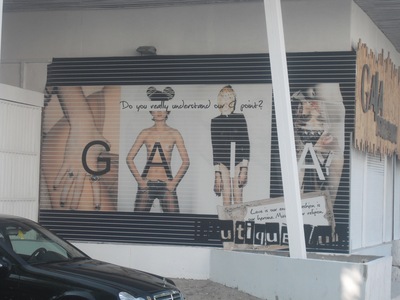 Constanta, Romania. August 2010
My native land of Australia is having a federal election on August 21, in which Liberal Party leader Tony Abbott will challenge Prime Minister Julia Gillard, who came to office in a party coup a mere five weeks ago. For those who are interested, I recently recorded a conversation with Patrick Crozier, in which he attempted to interview me about the issues at hand.
In this conversation, we cover issues such as how the Australian political system differs from the British system (and perhaps more crucially, how Australian political parties differ from British parties), just how and why Kevin Rudd managed to go from having some of the highest opinion poll ratings of any Australian Prime Minister to being tossed by his party in approximately nine months, the issues at hand in the electioin, and The Voyage of the Beagle by Charles Darwin.
Overhanging all this, though, is the recent party coup against Kevin Rudd. We spend quite a bit of time attempting to figure out the man’s downfall, and trying to figure out exactly how such a man became PM in the first place.
On the other hand, there are times when a music video is worth a thousand words. People without the time to listen to our conversation might instead consider simply watching this, which I think gets to the bottom of Kevin Rudd fairly quickly.
Unfortunately, although the conversation is timely and should be posted quickly, I have not had the opportunity to give it a great deal of editing. (I am presently in Romania, as part of having a life, and a touch short of editing facilities). As a consequence, the conversation still contains a few ums and ahs and pauses, and I think it is a little slow in starting. However, for those who want to give us a fair shake of the sauce bottle, I think it is pretty coherent once we get going. Enjoy.
We can confirm that eight of the nine people quoted on the website at the time either worked for the Identity and Passport Service (IPS), the Home Office or another government department or agency.
– A spokesman from the Identity and Passport Service (IPS) of the Home Office, in answer to a Freedom of Information request from Phil Booth of No2ID, asking how many of the people quoted on an IPS website expressing enthusiasm for the wonderfulness of their ID cards did in fact work for the government.
Actually, this was not a direct response to the FOI request, but was only admitted after the good Mr Booth demanded an internal review from the IPS after they answered the question with several lengthy paragraphs of content free bureaucrat babble the first time. Details thanks to The Register here.
Things have been a little odd in Australian politics recently. In the last month, the governing Australian Labor Party has sacked Prime Minister Kevin Rudd and appointed Julia Gillard as Australia’s first woman Prime Minister. While this has been going on, former Labor PM Paul Keating has been having a weird slanging match with former Labor PM Bob Hawke and his biographer/wife Blanche d’Alpuget. She was his biographer first. Long and somewhat tawdry story, which is some but not all that the slanging match (which has included a TV mini-series) has been about.
Obviously, the only thing that Ms Gillard could do in such circumstances was to call an early election, and thus Australians will be voting on August 21, even though the election may constitutionally be held as late as April 2011 . If this gamble does not pay off, Ms Gillard will be Australia’s fifth shortest serving Prime Minister. (Three of the shorter serving PMs held office very briefly during the period between when their predecessor either died or went mysteriously missing in the ocean and when their party elected a new leader, so she would be the second shortest Prime Minister ever placed in the job for reasons other than constitutional technicalities.
Australians, however, know what is important. Although televised leaders debates are a relatively new thing in the UK, they have been normal in Australian elections for over 25 years. The convention is that a debate will be held at 7.30pm on the first Sunday evening of the campaign. For this election, this would mean this coming Sunday.
Except, however, if it were held to that schedule this Sunday, the debate would clash with the season finale of the reality TV cooking show Masterchef Australia, and thus nobody would be watching. Therefore, the debate has been shortened from 90 minutes to 60, and has been moved from 7.30pm to 6.30pm. Really.
I am hoping to record a conversation about the personalities and issues behind this Australian election with fellow expatriate James Waterton at some point during this election campaign. Hopefully this should be up soon.
Update: The winner was Adam Liaw, the Japanese-Australian lawyer from Adelaide.
The internet’s completely over. I don’t see why I should give my new music to iTunes or anyone else. They won’t pay me an advance for it and then they get angry when they can’t get it. The internet’s like MTV. At one time MTV was hip and suddenly it became outdated. Anyway, all these computers and digital gadgets are no good. They just fill your head with numbers and that can’t be good for you.
– The artist formerly known as The Artist Formerly Known as Prince, explaining why he isn’t getting down with the tubes.
Over the next two days, there are two linguistically Spanish versus Portuguese games in the World Cup: Chile plays Brazil this evening, and Spain itself plays Portugal itself tomorrow evening. Brazil and Spain are two of the favourites to win the tournament, Portugal is a good side, although perhaps without the depth of the first two, and Chile have played much more impressively than most people expected in this tournament, but are outsiders. So probably a hard fought but still one-sided game this evening, and a good game tomorrow night. Although one of course never knows.
However, disregarding the actual sport and thinking about bigger things, it seems pretty clear that the governments of the two Latin American countries are rather less profligate and rather less broke than those of the two Latin European countries.
How did we get here?
When a person spends time at high altitude, that person’s body reacts to the lesser amount of oxygen in the air by increasing the number of red blood cells. These carry oxygen round the body, and if there are more of them, the body can process similar amounts of oxygen even though there is less of it available. If a person descends after spending days or weeks at high altitude, the higher number of red blood cells persists for a few days. In that period, the body is able to process much larger amounts of oxygen than is normal. This results in tremendous feelings of euphoria, and greater than normal athletic stamina. From personal experience, I can assure you that this feels wonderful. On one occasion, after descending several thousand metres in the Himalayas in several days, I felt like Superman. It was great. It was like being on the right drugs without actually being on drugs.
This effect can of course be duplicated at sea level. One way is to train in enclosed facilities with artificially lowered air pressure. Another, though, is medical. One can have one’s own blood removed from your body, the red blood cells filtered out, and these can be transfused back into your body in time for the athletic event. This is “blood doping”, and is much used in endurance sports, particularly cycling. It is generally considered to be cheating, but it is a very difficult form of cheating to detect. The fact that it is like being on drugs without the use of actual drugs perhaps gets to the core of the problem. Detecting the presence of drugs is relatively simple. Detecting the presence of the athlete’s own blood is simple too, but this doesn’t prove anything. As a consequence, athletes in affected sports are subjected to searches of their homes during the competition season in which inspectors look for medical equipment used in the necessary transfusions. (They also look for pharmaceutical supplies of the hormone erythropoietin, which stimulates production of red blood cells in the bone marrow).
Other tests for blood doping involve blood analysis, and involve such things as comparing the number of young red blood cells in a sample with the number of old blood cells, simply registering blood with an excessively high number of such cells as evidence of cheating. Plus they look for that hormone erythropoietin, for which it is apparently possible to tell the difference between the cloned and artificially produced version and the natural version produced in the athlete’s kidneys, although this distinction is sometimes controversial.
The trouble with tests of this kind is that they have difficulty distinguishing between people who are cheating (according to the rules) and people who simply have extreme and unusual physiology. To some extent, high level sport is all about identifying people with extreme and unusual physiology. The right kind of extreme and unusual physiology is known as “talent”. The aim of much performance enhancing technology is all about mimicking the extreme and unusual physiology that the finest athletes have naturally. Distinguishing between the naturally weird and the artificially weird by testing for weirdness is problematic.
And in the case of blood doping, we have a further problem. Blood can be doped naturally, simply by training at altitude. You cannot simply ban all athletes who live or train at altitude: that would be ‘discriminatory’. However, it leads to a situation where an athlete with a high red blood cell count due to altitude is a fine, well trained athlete and a role model for our children. One with a high red blood cell count due to a transfusion at sea level is a cheat and someone to be despised, even though the end result of both techniques are the same. (This makes me think of “organic” food, somehow. Food grown with nitrogen from natural fertilisers is good. Food grown with identical nitrogen from artificial fertilisers is bad).
Governments find it highly prestigious when national athletes win Olympic gold medals, and are often willing to spend money on elite athlete training programs. Two kinds of governments seem to do this. There are totalitarian regimes who wish to demonstrate that their system is superior by producing superior athletes. Classically, we are talking East Germany, the USSR, and more recently China. Such governments seem perfectly willing to break the rules if they think they can get away with it. More recently, though, we have freer, more democratic rich countries doing the same thing. As the state expands, development of the national Olympic team becomes part of its remit. Outright cheating has certainly occurred in such training programs too, but in a democracy it becomes a major scandal if you are caught. Therefore, government funded programs in democracies tend to prefer to remain within the (always very arbitrary) rules, but they will go as close to them as they can without actually breaking them.
If you are going to find a place to train at altitude, for fairly obvious reasons you want a place that is high but not too cold, so you are going to want it to be on a mountain not too close to the poles. You ideally want it to be on an isolated mountain rather than high up a mountain range, so athletes can regularly practice going from high altitude to low and vice versa. You are going to want it to be in an area where the other facilities of an advanced, high technology country are readily available – good hospitals and access to all kinds of medical professions, nice hotels, housing, and restaurants for associated officials, staff, and hangers on, etc etc etc. Basically, you want a high mountain in the desert in a rich country near a significant town.
Once you understand all this, what one finds clinging to the side of a mountain when one approaches the top of the Sierra Nevada in Andalucia in southern Spain (the southernmost high mountain in Europe) becomes perfectly logical: an athletic track and vaguely Orwellian looking training and accommodation centre for athletes.
A little googling indicates that it belongs to the vaguely Orwellian sounding Senior Sports Council of the Ministry of Education and Science of Spain. Amongst the benefits of training there, I find the euphemistically described erythropoietic stimulus, which is entirely different from blood doping. Obviously.
As I said, all perfectly logical. Perfectly.
Oh, who am I kidding? This is the oddest facility I have encountered since the time I went to Hitler’s holiday camp.
Hitler would have loved this, too.
Disregarding my long standing feelings about Association Football, I have been watching the World Cup. England fans have rapidly gone from optimism after England’s excellent qualification campaign to pessimism after two lackluster draws in the first round against the United States and Algeria. From my present location in Spain, I can report that Spanish fans and the Spanish media are even more brittle than those of England: it only took one goal from Switzerland to get from “We are certainties to win this” to “Oh no, not again”.
As with most stock market swings, though, the supporters of both teams are guilty of massive overreactions to events, both before and after the games so far.
Firstly, England fans who have decided that their side is crap and that the sooner they are out of their misery the better should consider the performances of each of the five large western European countries:
Spain managed that 1-0 loss to Switzerland.
Germany lost 1-0 to Serbia.
France lost 2-0 to Mexico, a star player has been sent home and the other players are apparently on strike.
Italy were held to a 1-1 draw against New Zealand, and even that was only after being given a slightly dubious penalty. I watched this in a cafe full of Italians, and allowed myself to laugh loudly when the cameras showed utterly stone-faced Italians in the crowd at full time. I wouldn’t have allowed myself to do this in a bar full of England fans in similar circumstances if I had wanted to continue living, but this was fine with the Italians, and probably to their credit. On the other hand, my supporting a New Zealand team at anything – I do not think that has ever happened before.
A case can be made that England’s 1-1 draw with Algeria is the best result out of that lot. And yet, the claim that none of these sides will make the final stages seems absurd. One or two of those sides will miss the second round. Most likely these will be France and/or Italy, both finalists last time, but generally considered the two weakest of those five sides going into this tournament. And there is a fair chance that one of England, Germany, and Spain will miss out. However, at least two and likely all three will make it, and at that point everything starts again.
The best European side outside that group – and the greatest footballing nation to never win the World Cup – is the Netherlands, and they are looking good and appear to be playing well within themselves. The Dutch produce the best managers in the world, but they are a small country and one doubts they have the depth to actually win. I would be happy if they did, but I am dubious about their ability to do so.
So my feeling is that at least one of England, Spain, and Germany will survive a lackluster first round and get close to winning the tournament. Most likely this will be Germany, not so much because they have a better side than because they are more capable of understanding that the lackluster first round does not matter much. The point of the first round is to make the second round. If you have done that, everything is fine. And everything will be fine for England if they beat Slovenia on Wednesday. At least, fine apart for the fact that Wayne Rooney appears to be a stupid idiot, but we suspected that already, and he still scores goals for Manchester United.
Of the two strongest South American sides, Argentina are looking good but are a touch unpredictable and have a history of looking good early and going down later. On the other hand, this is Lionel Messi’s chance to demonstrate he is one of the all time greats. One kind of wonders about the whole Diego Maradona as manager thing, too, although one is also unsure whether he is the person actually running things. Whether or not he is, his presence might be a help if Messi is to do what Maradona did in 1986. Carlos Tevez playing so well is nice, too.
Brazil could only defeat North Korea by one goal, but they are Brazil, they did fine against Ivory Coast, and they look to be cruising at this stage of the tournament. In truth, not much to criticise there. Plus, no European side has ever won the tournament when it was held outside Europe and no Latin American side has ever won it outside Latin America besides Brazil, who have done this three times. Does that matter?
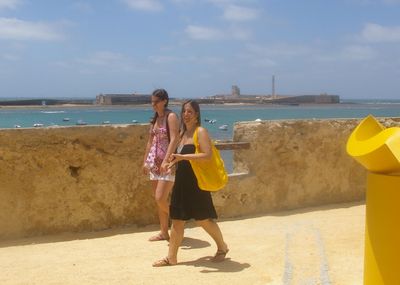
Oh never talk again to me
Of northern climes and British ladies;
It has not been your lot to see,
Like me, the lovely girl of Cadiz
Although her eye be not of blue,
Nor fair her locks, like English lasses,
How far its own expressive hue
The languid azure eye surpasses !
– George Gordon, Lord Byron
The above video, in which Australian(*) comedian John Clarke gives a witheringly succinct summary of the present European fiscal crisis, has been making the rounds of certain parts of the internet in recent days. It is great to see Clarke’s work getting attention in the world outside Australia, because he has been putting stuff as good as this out on a weekly basis for decades now.
In fact it would be nice if Australian political satire became better appreciated in the world outside Australia more generally, because the totally tactless take no prisoners approach that much of it has can at times be refreshing in the world of bullshit in which we live. (Seriously, can you imagine anyone of any other nationality pulling off this?)
While John Clarke’s mock interviews are often hysterically funny, perhaps his greatest piece of work is the television series The Games, that ran on Australian television in 1998 and 2000. This series was a mock documentary that supposedly chronicled officials organising the Sydney 2000 Olympic games. It showed idiotic bureaucrats getting into all kinds of dubious scandals of incompetence, massive waste, and corruption. The first series of this program ran several years before the Sydney games, and was met by a certain amount of bafflement by audiences as the fact that the Olympics were indeed being run by incompetent idiots was not at that point widely appreciated. By the year 2000, actual scandals had occurred to such an extent that the program looked like a rather mild reflection of reality. The second series ran immediately before the Olympics in 2000, and people watched it, nodded, and rather wished that reality was not like that.
Two years out from the London Olympics of 2012, we have seen nothing anywhere near this harsh in the British media. Perhaps this is because British television lacks the viciousness of certain parts of Australian television. (Print media are completely the other way round. Australian newspapers entirely lack the viciousness of the London tabloids). If the BBC or any of the other television networks over here had any style, they would simply take the Australian program from 1998 and run it. In prime time.
(*) Clarke is actually a New Zealander, in about the same sense that William Shatner is a Canadian.
|
Who Are We? The Samizdata people are a bunch of sinister and heavily armed globalist illuminati who seek to infect the entire world with the values of personal liberty and several property. Amongst our many crimes is a sense of humour and the intermittent use of British spelling.
We are also a varied group made up of social individualists, classical liberals, whigs, libertarians, extropians, futurists, ‘Porcupines’, Karl Popper fetishists, recovering neo-conservatives, crazed Ayn Rand worshipers, over-caffeinated Virginia Postrel devotees, witty Frédéric Bastiat wannabes, cypherpunks, minarchists, kritarchists and wild-eyed anarcho-capitalists from Britain, North America, Australia and Europe.
|
